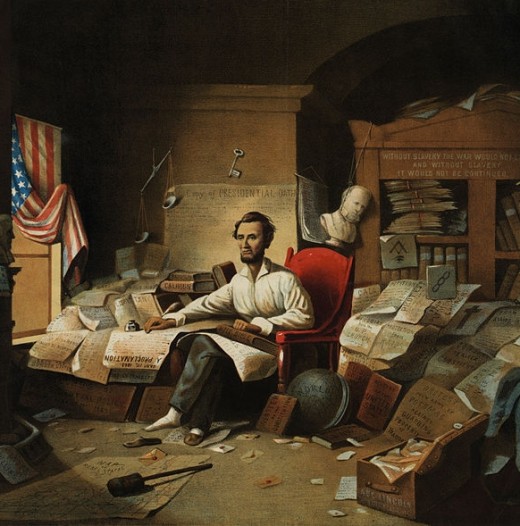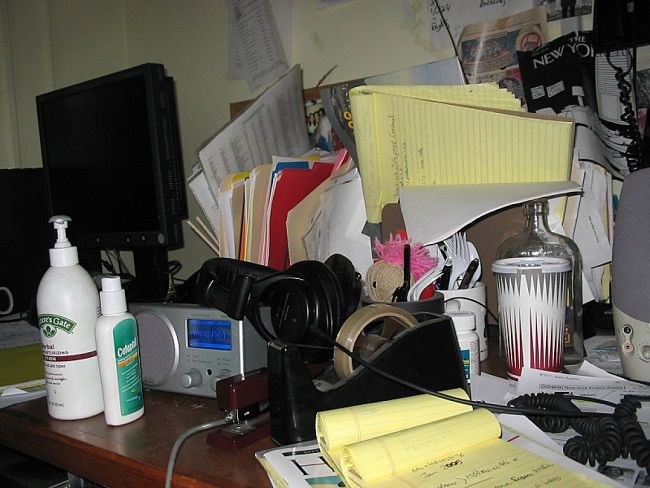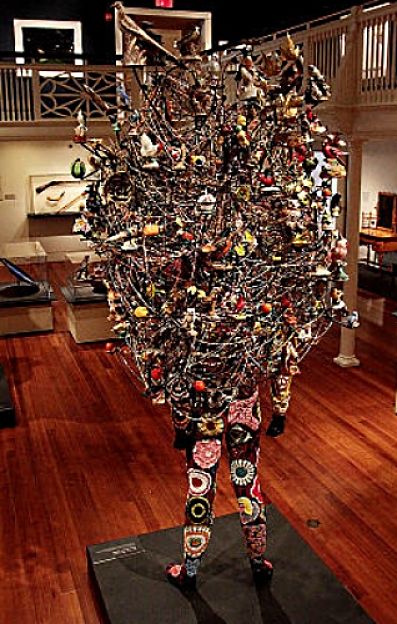Messiness is a Sign of Creativity, After All, So There!
The great debate about the need for tidiness, order and simplicity in life is thrust upon us by our parents, peers, bosses, workplace safety bullies and our friends.
When we object and say clutter is creative they say: “Really, Show Me the Benefits”.
Sure, Cleanliness is essential and its absence can be harmful, but Clutter can be Clean and why does Cleanliness equate to a sterile empty desk with a polished surface.
Fortunately some recent research has come to light to justify the pursuit of clutter.
My supervisor at University once remarked that "Messiness is a Sign of Creativity" and I have attempted to be creative ever since.
Einstein is reported to have asked "If a cluttered desk is a sign of a cluttered mind, of what then, is an empty desk [ the sign of ] ?"
I saw a book title once that began: "Perfect Mess: The Hidden Benefits of Disorder".




Messiness, Clutter, Entropy and The Uncertainty Principle
Perhaps this debate about the merits of clutter vs order all flows from the great Uncertainty Principle in Physics.
In the complex field of quantum mechanics, the 'Heisenberg' Uncertainty principle states that the more precisely you try to locate exactly where some particle is, the less precisely will its momentum or direction be known, and vice versa. It’s sort of like the 'Will of the Wisp' that you can’t tie down. Watching something sort of moves it.
Another aspect of Physics, 'Entropy', is even more relevant here, as we are all ruled by the physical laws of the universe.
The definition of Entropy is:
“all energy and matter in the universe tend to move towards a state of maximum disorder or randomness, and towards an equilibrium or inert uniformity.” Got that!
Squirt some blue magnetic gas particles into a jar in space and the molecules will quickly disperse throughout the jar. Put a magnet next to the jar and the particles will all be drawn to it. Take it away and they will all disperse. It takes the energy of the magnet to hold the particles together and fight against entropy that is trying to pull them apart.
Basically this says that all desks will try to revert to an ultimate state of messiness and disorder and that it takes a lot of energy to keep desks clean. But is this simply a waste of good energy that could be better used on being creative. Why fight against the physics of the universe?
In 1944, Erwin Schrödinger stated that:
“life feeds on negative entropy”. This very pithy statement means that all living things have to fight against entropy every day of their lives and entropy is trying to turn ‘dust to dust”. It takes energy to stay alive. Life is order made from chaos. Plants get energy free from the sun but animals must get energy from elsewhere. Animals feed on the structure built into plants. Breaking down the plant’s molecules enables animals to capture the energy within. And so we feed on negative entropy (structure and order).
In 1964, James Lovelock was given the task of how to look for life on Mars and other planets. To do this requires an answer to the question “What is life, and how to recognized it?”
His response was look for signs of entropy reduction in the alien world, since this is a primary characteristic of life. So the signs of life are to look for structure or order in a world that should be disordered. One must look for a “reduction or a reversal of entropy” on Mars or other planets.
Maintaining structure requires a fight against entropy that is trying to turn it back to dust. This is the universal characteristic of life to use energy to sustain order in the chaos.
What does this have to do with messiness and clutter?
Clearly it takes time and a lot of energy to keep things ordered and tidy as the law of entropy says all desks will tend to be messy and will become messy in time. Is this energy better spent on other things? Why fight against the laws of nature?
Research has shown that messy people are different. They are more open to new experiences and they are less rule-bound and more determined to achieve a good outcome. The tidy ones often use the scapegoat of tidying up as an excuse to give up.
So messy people stop feeling guilty for your creative mind. Don’t be forced to waste your precious time cleaning up. Don't let orderly people and bossy bossed bully you into having to clean up.
Dispelling the Myths about the Negative Impacts of Being Cluttered
1. “You need to get organized to succeed.” No! This is only required when you start something new and very occasionally when you can’t move
2. “Being more organized and tidy mean better performance.” There is a big difference between having a bare desk and knowing whether everything is. Having a place for everything, and being able to locate it easily does not equate with ultra-tidy. Most messy people know exactly where everything is and can find it quickly. Tidy people will often takes lots of time trying to find things because they have dump them in random drawers in an effort to be tidy. Being organised is the key to good performance but this does not equate to being tidy.
3. “Calendars and being disciplined about storage spaces and files improves efficiency.” This only works to a certain extent. People find that they waste so much time on filling out all the details and complex filing systems, when simpler ones would work better. Don’t let the tail wag the dog.
4. “Disorder inspires conventional and conservative outcomes. Only the more organised can break with convention.” Research has shown that the opposite is true. Seemingly untidy environments seem to inspire innovation and breaking free from tradition. More orderly environments encourage playing it safe with convention approaches.